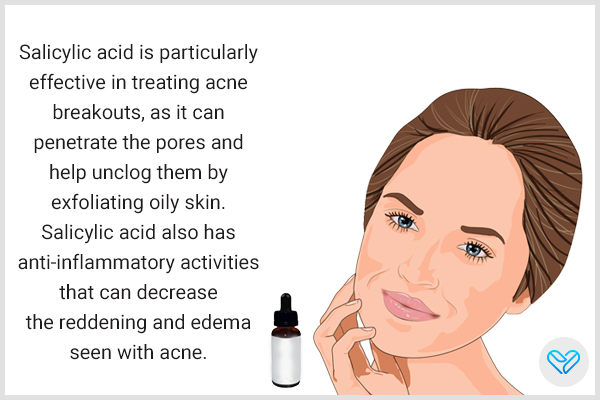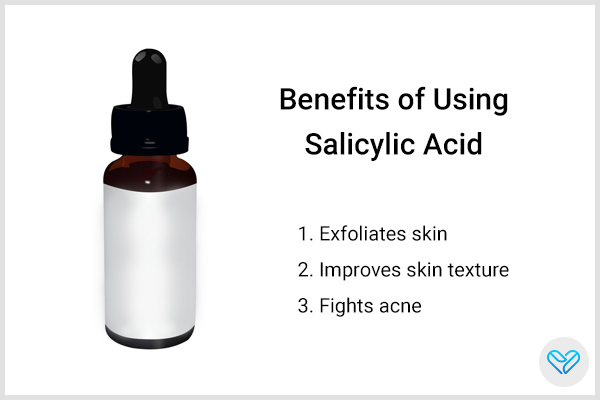In this article:
Mandelic acid and salicylic acid are both well-known ingredients in skin care products, particularly for addressing various skin concerns. These two acids offer distinct properties and benefits that make them effective for different skin types and conditions.

Mandelic acid is an alpha-hydroxy acid (AHA) that has gained a lot of attention for its gentle exfoliating properties and suitability for aged or sensitive skin. (1)
On the other hand, salicylic acid is a widely recognized beta-hydroxy acid (BHA) (2) known for its ability to penetrate the pores and treat acne, making it a go-to ingredient for oily and acne-prone skin. (3)
Understanding the characteristics and effects of mandelic acid and salicylic acid can help individuals choose the most appropriate acid for their specific skin care needs.
Keep reading to figure out what is best for you.
Mandelic Acid or Salicylic Acid: Which Is Better for You?
| Mandelic acid | Salicylic acid |
|---|---|
| Good for sensitive skin | Good for greasy skin or skin susceptible to acne breakouts |
| Improves the appearance of aged skin | Exfoliates skin |
| Reduces different types of acne lesions | Improves skin texture |
| Promotes exfoliation | Treats acne |
| Maintains skin suppleness |
Who should use mandelic acid?
Mandelic acid, being an AHA, is a type of fruit acid that can be beneficial for various skin concerns.
Mandelic acid is often recommended by experts for people with sensitive skin or people who experience reactions such as irritation or redness from other exfoliating acids. Its large molecular size allows for slow and even absorption, making it a great choice for sensitive skin. (4)
Individuals with rosacea or easily irritated skin may benefit from using mandelic acid as it provides exfoliation without causing significant irritation or discomfort.
Additionally, mandelic acid’s properties make it suitable for addressing skin problems, particularly in people with sensitive skin. A study showed that if you have sensitive skin and want to treat your acne, using products with mandelic acid can be a good option for you. (4)
Another research demonstrated how mandelic acid stimulates the production of certain substances such as hyaluronic acid and makes the skin appear smooth, while also reducing wrinkles, lightening age spots, and decreasing blemishes. (2) Thus, it is appropriate for usage in mature or aged skin too. (1)
Who should use salicylic acid?

Salicylic acid is commonly suggested for people with greasy and acne-prone skin.
BHAs, such as salicylic acid, have a unique characteristic – they are lipid soluble, which means they can penetrate the skin through the sebaceous follicles. This makes salicylic acid effective for those dealing with excess oil and clogged pores. (2)
Salicylic acid is particularly effective in treating acne breakouts, as it can penetrate the pores and help unclog them by exfoliating oily skin. (5) Salicylic acid also has anti-inflammatory activities that can decrease the reddening and edema seen with acne.
Therefore, if you have oily skin, are prone to acne, or have blackheads and clogged pores, salicylic acid may be the better choice for you. It can help control excess oil production, treat acne, and discourage any further breakouts.
Mandelic Acid: Benefits and Side Effects
Benefits of using mandelic acid
Mandelic acid offers several advantages for your skin.
1. Combats skin aging
Mandelic acid can improve the appearance of aged skin by reducing fine lines, wrinkles, and loss of elasticity. It has been established to be useful in addressing these concerns. (1)
2. Controls acne
Mandelic acid is a helpful ingredient for treating acne. Its antibacterial and anti-inflammatory properties make it effective in reducing different types of acne lesions, such as comedones, papules, and pustules. (6)
3. Manages skin pigmentation
Mandelic acid’s unique properties allow it to penetrate the skin evenly and effectively address issues such as redness and uneven skin tone. (7)
4. Mildly exfoliates skin
When applied to the skin, mandelic acid works by promoting exfoliation of the topmost layer of the skin, resulting in the removal of dull and rough skin cells and stimulating cellular renewal. (2)
5. Keeps the skin supple
Mandelic acid helps improve the barrier function of the skin, increases skin thickness, promotes hydration, and stimulates the production of substances such as hyaluronic acid, which aids in maintaining skin suppleness. (2)
Possible side effects of mandelic acid
Mandelic acid is generally considered safe to use with minimal side effects. Nonetheless, some people may encounter a bit of itching or redness, although these side effects are uncommon.
Salicylic Acid: Benefits and Side Effects
Benefits of using salicylic acid

Salicylic acid offers several advantages for your skin.
1. Exfoliates skin
Salicylic acid helps remove dead skin cells as it loosens the bond between them. This allows your pores to get rid of these dead cells, keeping them unclogged. (8)
2. Improves skin texture
By exfoliating the skin, salicylic acid helps improve its texture, making it appear smooth. It also unclogs pores, giving them a tight and improved overall look. (5)(9)
3. Fights acne
Salicylic acid is effective in treating acne, which is quite a common problem for those with greasy skin.
Studies have shown that using solutions with 0.5%–2% salicylic acid can reduce the number of acne lesions. In fact, it has been found to be better than benzoyl peroxide for this purpose. (10)
Possible side effects of salicylic acid
Salicylic acid may cause some mild and temporary side effects, such as erythema and drying of the skin. Nevertheless, these issues can be readily managed by consistently applying moisturizers to the skin. (5)
Can Mandelic Acid and Salicylic Acid Be Used Together?
If you want to use both acids together, it is suggested to begin with a lower potency of each and slowly raise the concentration if your skin tolerates it well. You can use mandelic acid in the morning and salicylic acid in the evening, or alternate their usage on different days.
However, it’s crucial to attend to your skin and see how it responds. If you experience any signs of irritation, redness, or discomfort, it is advisable to discontinue or reduce the frequency of use.
Most-Asked Questions
Which acid is better for sensitive skin?
Mandelic acid is generally better for sensitive skin due to its gentle nature.
Which acid is better for acne-prone skin?
Salicylic acid is frequently advised for acne-prone skin due to its ability to penetrate and clear pores.
Can mandelic acid help with hyperpigmentation?
Yes, mandelic acid has been seen to be adequate in lessening hyperpigmentation and improving skin tone.
Which is better for both oily and sensitive skin?
Mandelic acid may be a better option as it is mild enough for sensitive skin while still delivering oil control benefits.
Final Word
Both mandelic acid and salicylic acid have extraordinary advantages for the skin, making them valuable ingredients in skin care.
Mandelic acid is well suited for sensitive skin and can help improve skin texture, hyperpigmentation, and acne. On the other hand, salicylic acid is especially useful for oily and acne-prone skin, with its ability to unplug pores and decrease inflammation.
While using mandelic and salicylic acid together can be safe and provide complementary effects, it is important to consider individual skin sensitivity and tolerance.
- Was this article helpful?
- YES, THANKS!NOT REALLY


